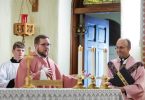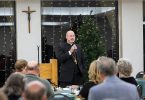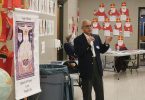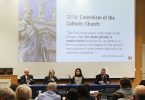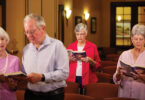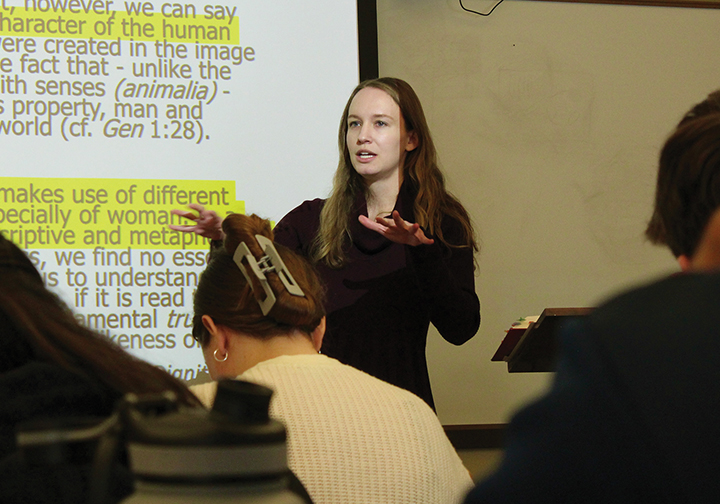
by Jack Figge
Special to The Leaven
ATCHISON — As ChatGPT, the advanced language model developed by Open AI, becomes increasingly prevalent in Catholic education, educators are facing new challenges, such as the ethical implications of relying on AI-generated answers and the need to balance technology with traditional teaching methods to ensure students receive a well-rounded education.
The opening sentence to this article was the work of neither a human author nor divine inspiration. Instead, it was generated by the new technological programming software called ChatGPT, which responds to a user’s prompt with a unique set of script.
For Catholic educators, not only has the creation of ChatGPT forced them to rethink teaching methods, but also to reflect on the fundamental mission and purpose of Catholic education.
Released on Nov. 30, 2022, ChatGPT has surged in prominence as people flock to the site seeking immediate, easy responses to their prompts. Upon receiving a prompt, ChatGPT scours text databases and online resources to write human-like text.
Across the country, students at every level of education are turning to ChatGPT to write papers and complete assignments, opening a new front for educators in the battle against cheating and plagiarism.
Upon the release of ChatGPT, educators and administrators of high schools and colleges within the archdiocese have sought to address this issue and understand how ChatGPT should work with the mission and identity of Catholic education.
The Catholic Church recognizes the value of technology in helping to advance society and build up the kingdom of God. Msgr. Stuart Swetland, president of Donnelly College in Kansas City, Kansas, believes that almost all technology can be used for some good.
“The church is never against the ethical use of advancements in technology,” he said. “Technology is to serve building up the kingdom. There are very few technological advances that don’t have good and bad uses.”
In respect to Catholic education, technology should be used as a tool to enhance a curriculum rooted in personal relationships and the faith. Kimberly Shankman, dean of Benedictine College in Atchison, recognizes that when one relies too heavily on technology, the person loses out on the relational aspect that is fundamental to a Catholic education.
“The important thing to remember from the perspective of Catholic educators is that technology always has to be the tool, not the driver,” said Shankman. “Catholic education is primarily based on a human relationship, as Pope Benedict tells us. That relationship cannot be simulated with your computer, your remarkable tablet or whatever other piece of technology that you have.”
Assistant professor of theology at Benedictine Dr. Mariele Courtois recognizes the value of building relationships within her classroom. ChatGPT, however, encourages college students to consult technology instead of teachers or faculty members for help.
“What I explained to my students is that oftentimes people are tempted to cheat because they’re trying to avoid some type of relationship,” said Courtois. “For example, if they need a longer deadline, instead of talking with the professor and asking them, they’ll try to find a shortcut, like ChatGPT, so that they can still meet the deadline. Or if they have questions about how to cite sources, instead of asking a librarian or the Writing Center, they’ll try to find a way where they can sort of get the answer quickly without knowing and understanding it.”
What sets a Catholic school apart from its secular counterparts is its mission to not just teach students, but to form them into saints. At area high schools, administrators see ChatGPT as a threat to the formation process as it provides students with shortcuts.
“Technology like ChatGPT can give the impression that the only thing that matters is getting the product done,” said Dr. Shane Rapp, principal of St. James Academy in Lenexa. “ChatGPT is really forcing us to reconsider what is the purpose of school. For us, as a Catholic institution, the purpose of schools is the formation of a person.”
When a student uses ChatGPT to write a paper, schools consider the act plagiarism. In the eyes of the church, using another person’s work — or in this case, a computer’s work — violates the Seventh and Eighth Commandments regarding the act of stealing.
“Morality tells us if we’re going to be honest and not violate the Seventh and Eighth Commandments, that we should only put forward our own ideas in writing — not things that we lifted from other sources,” said Msgr. Swetland. “It’s both a justice issue and an honesty issue. ChatGPT is just one other source that you could plagiarize with.”
Since ChatGPT is currently in its infancy, teachers and administrators have had little conflict with students using it to cheat. Yet there have been some cases. This semester, many teachers at Benedictine added clauses to their syllabus that prohibit the use of ChatGPT.
In addition, teachers are assigning papers that prompt students to write more personalized reflections instead of research-based papers, that students could use ChatGPT to complete with minimal work.
“In my syllabus, I have a new portion of the academic dishonesty section that specifically names ChatGPT,” said Courtois. “Another thing that I want to do is make sure that the students understand the reason why they’re doing each of their assignments.”
In a larger sense, Catholic administrators like Maureen Engen, principal of Bishop Miege High School in Roeland Park, seek to help others recognize that a Catholic education is about more than intellectual development; its mission is social and spiritual formation as well.
“Our goal is for each of these students to know they’re created to do something that no one else is created to do,” said Engen. “Our schools don’t exist to make sure that our kids have all these answers. They exist to help these students become saints.
“We only do that through fostering virtue.”


